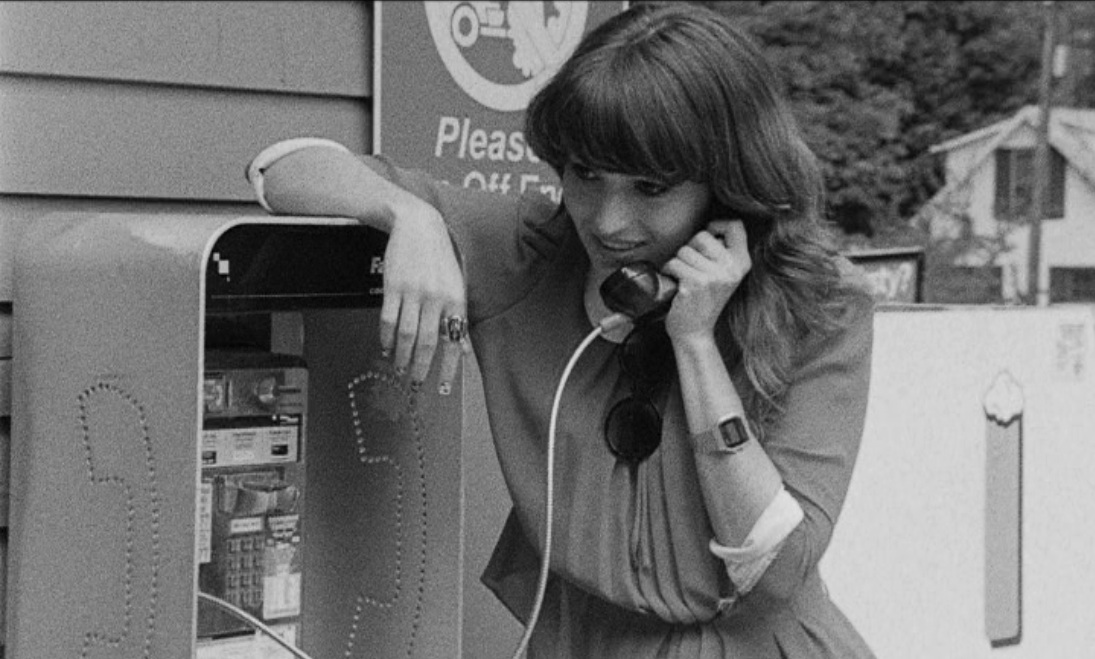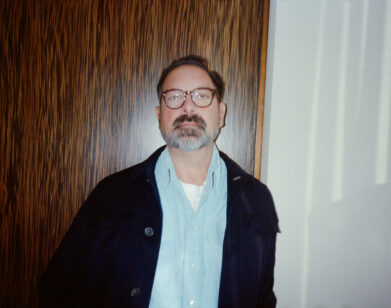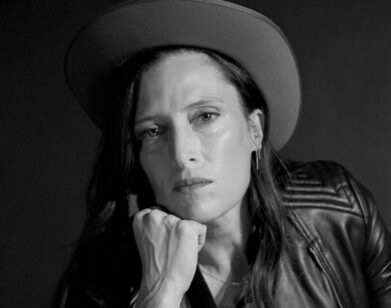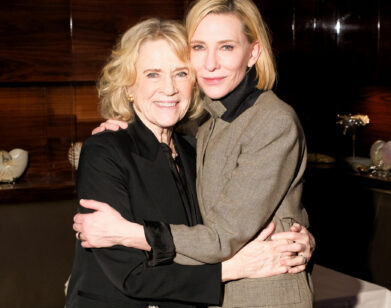The Color Wheel’s Comic Gold

CARLEN ALTMAN IN THE COLOR WHEEL. FILM STILL COURTESY OF ALEX ROSS PERRY AND CARLEN ALTMAN
Alex Ross Perry’s new film The Color Wheel drolly captures the mood of a generation caught in deferred adulthood. The movie, which stars and was co-written by Perry and Carlen Altman, tells the story of a dysfunctional brother-sister relationship. Altman plays J.R., an increasingly lost twentysomething beauty, who forces her younger brother Colin (Perry) to join her on a weekend road trip, so they can move her out of her professor-turned-lover’s apartment. The visually striking film, which was shot on low-contrast black-and-white 16mm film, is filled with downbeat witticisms and loopy humor.
Perry, 26, is a rising independent filmmaker. In 2009, he won best foreign film at the Melbourne Underground Film Festival for his debut film, Impolex, which was partly inspired by Thomas Pynchon’s novel Gravity’s Rainbow. Altman, 27, is a comedian, jewelry designer, and actress, who appeared in Ry Russo-Young’s 2009 film You Wont Miss Me and in fellow Oberlin grad Lena Dunham’s web series Tight Shots.
Two days after winning best narrative feature at the Chicago Underground Film Festival and receiving a rave review from The New Yorker, we met at a café in Greenpoint, Brooklyn, to talk about the film. We began by discussing the idea that prompted them to make a movie about two people who once shared something, but have since grown apart.
ALEX ROSS PERRY: I just think there’s something really, seriously wrong that upsets me and disgusts me about a certain generational malady that is sweeping people in their late twenties and early thirties right now. I feel like a lot of people refuse to try. I had these questions for myself. And what I wanted to explore is, why was it so important to me to try?
CARLEN ALTMAN: Yeah.
PERRY: When we met, I had just finished my first movie [Impolex], which I made when I was 23. And I was excited—that was something that I wanted to do for 10 years of my life. Pretty soon afterward, I started to feel very disconnected from people that I went to film school with, who I always thought would join me in quitting their jobs and making these movies. I felt like there was this very specific, somewhat alarming phenomenon of people that I knew—
JULIA YEPES: [laughs] Somewhat alarming—
PERRY: It is alarming because these are people who I, in some cases, had hours of beautiful conversation with about all these great things we were going to do! It’s not just people who wanted to do the same things as me. It’s people who I felt were really enthusiastic about something. I assumed that, like me, they would do it as soon as possible. I don’t really understand why you wouldn’t. You’re young, it’s a time when you can still fall back on something. Nothing would have developed had that not been a very mutually upsetting thing.
ALTMAN: I agree.
YEPES: One thing that’s funny, but that I also thought was cool or admirable, is J.R. has big dreams [of being a news anchor], and even though she doesn’t necessarily have a plan, she has guts. So when she sees the news anchor, she approaches her. Some people have secret ambitions that they wouldn’t tell anyone.
ALTMAN: In real life, I get scared to ask for help. I would never go up to somebody who’s famous at a restaurant, and be like, hey, can you help me out, but I think I secretly wish I could. And I secretly worry that I am untalented. So the character J.R. always, to my mind, represents my worst fear of someone who’s like, “Help me,” but doesn’t have anything to show for her loudness.
YEPES: There’s a quick shot of her résumé, and one of her only performing credits is as a “stoic tree” in The Nutcracker.
ALTMAN: Yeah, in third grade or something. [Yepes laughs] Exactly. Thanks for noticing.
PERRY: We both felt that the motivations of Carlen’s character speak for us personally. The motivations of my character speak to the more rational fear that we might benefit from having. We don’t actually have full-time jobs or—
ALTMAN: A sense of stability.
PERRY: J.R., to a somewhat funny fault, lives without any shred of safety net, shame, or dignity. That’s the farthest extreme of what we believe in. And my character lives with absolute shame and fear.
YEPES: Did you set out from the beginning to make it a comedy?
ALTMAN: I think so, yeah.
PERRY: First of all, I thought that the story was going to have so much anger and so much dark, hateful disappointment and resentment in it that if there were no jokes than people wouldn’t be able to watch it. My feelings on this matter aren’t really funny. But I wanted to present this story that does mean something to me, and is something that I view as nothing short of an epidemic of malaise amongst young people, and turn that into something that you could laugh at.
YEPES: Near the end of the movie, J.R. delivers a long, very specific monologue. How did you come up with it?
PERRY: It was always part of the original outline. It was written and rewritten.
YEPES: But who wrote it?
ALTMAN: He wrote it, mostly. [laughs]
PERRY: You were very quick to point that out just now—you washed your hands of any responsibility.
ALTMAN: No, no, no, I thought you’d want that!
PERRY: —No, no, no—
YEPES: —No, no, no—
ALTMAN: I think it was a joint effort. I remember saying something about how everyone goes to sleep at night. I don’t know what that really had to do with, but it’s just something I think about. Thankfully, we only needed to shoot one take.
YEPES: Alex, you had a long monologue near the end of Impolex too.
PERRY: I know, it’s my thing.
YEPES: Was that inspired by any other movie?
PERRY: When I was working on Impolex, I saw Last Tango in Paris (1972), which has five-minute shots of Marlon Brando talking, talking, talking. They’re major bursts of information that are incredibly helpful to understanding the character’s motivations, which is important because his behavior is inappropriate. But the biggest influence for me is Philip Roth’s novels, which have not been successfully adapted into movies. His books are 100 percent about language and how it relates to his characters’ private lives. Using language in the way that he does—that’s what novels are for, and that’s why he’s the best novelist. But using language like that in a film is risky and that was something I thought we should do. Spiritually and thematically, I thought it was the most appropriate way to let characters have their say.
YEPES: I want to hear more about how you wrote the script together. How did you do that?
ALTMAN: We met every week in my horrible apartment and talked about ideas we wanted to accomplish. There are certain things that I wanted to be in a movie and there were certain things that Alex wanted, and we sat with pads of paper and combined them.
YEPES: Like what? What things did you want in the movie?
ALTMAN: Random lines. One was like, I want to let my bangs grow out, but then how will people know that I’m the type of girl that likes music and art and cultural things?
YEPES: That line got a big laugh at the press screening.
ALTMAN: Awesome. Thank you, I’m glad to hear it.
YEPES: What are some of your favorite comedies?
PERRY: The only comedy films that I thought about as the impetus for making this movie or casting myself in it were Jerry Lewis’s. Not in the sense that I’m falling out of closets or trying to balance plates while they’re covered in food, but to me, there’s something provocative and really courageous about his absolute, unchained ego in writing, directing, and producing films where he’s playing three, four, or eight characters. That, to me, is one of the most brilliant expressions of comedic id ever.
YEPES: So Alex, you were going to play the brother from the beginning. Had you acted before?
PERRY: Never. Carlen has much more experience.
YEPES: Carlen, have you ever been in plays?
ALTMAN: No, I’m really bad at memorizing things. My mom is an artist-slash-theatrical agent, so sometimes she’ll send me on auditions and I’ve never gotten anything in my whole life, except for a George Foreman infomercial. [Yepes and Altman laugh] Our house would have résumés all over the floor, so I would look at these faces of people who really did list things like “stoic tree” as their one credential, trying to be like, Look at me! Come to my showcase in Hoboken. I never wanted to be an actor-actor—I need to be creatively involved. That’s why it was fun working with Lena [Dunham]. She really appreciated my sensibility. And Alex too. But I admire actual actors.
YEPES: Like who?
ALTMAN: I really like Cameron Diaz in Being John Malkovich (1999), where she’s the weird character with pets. I just saw that recently for the first time. But I don’t necessarily think of her as any sort of inspiration! [laughs]
YEPES: Alex, what about you?
PERRY: For this film, I thought about how Vincent Gallo treats Christina Ricci in Buffalo 66 (1998), which is, I need you here, but I’m going to treat you as terribly as possible. He’s probably my favorite filmmaker working today, and a hero, as far as acting goes. He’s one of my favorite comedians, and I’m sure he would agree [that he’s a comedian].
YEPES: Do you have brothers or sisters?
PERRY: Um, on the record, no. And you can print that.
ALTMAN: I have a half-sister, who I’ve only met five times. She’s like 20 years older than me. So no, I don’t have any siblings. I always wanted one. I had a lot of pets instead.
THE COLOR WHEEL WILL SCREEN AT BAMCINEMAFEST ON SUNDAY, JUNE 19. FOR MORE ON THE SCREENING, CLICK HERE.






